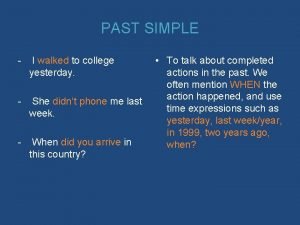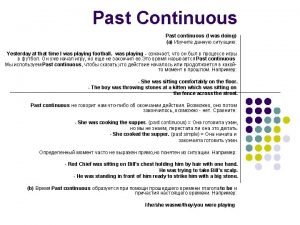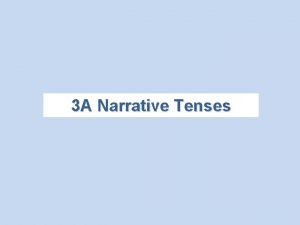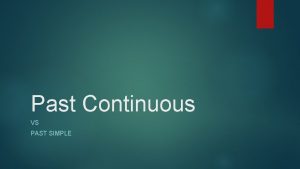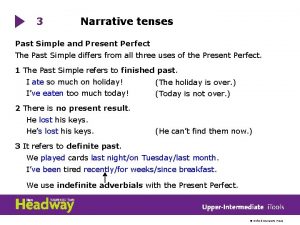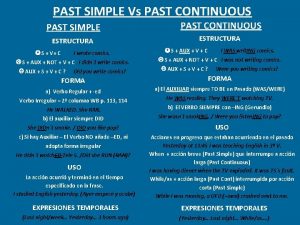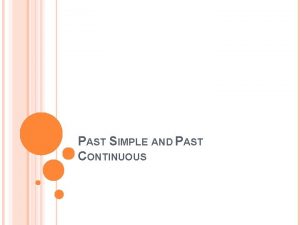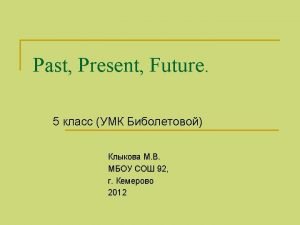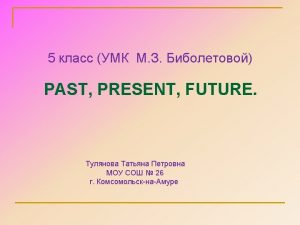PAST SIMPLE I walked to college yesterday She











- Slides: 11

PAST SIMPLE - I walked to college yesterday. - She didn’t phone me last week. - When did you arrive in this country? • To talk about completed actions in the past. We often mention WHEN the action happened, and use time expressions such as yesterday, last week/year, in 1999, two years ago, when?

FORMS OF THE PAST SIMPLE POSITIVE I/you/he/she/it/we/they finished went NEGATIVE (did not/didn’t + verb) I/you/he/she/it/we/they did not/didn’t finish did not/didn’t go QUESTIONS (did + subject + verb) Did I/you/he/she/it/we/they finish Did I/you/he/she/it/we/they go

PAST CONTINUOUS -It wasn’t raining at the time. -What were you doing at 6 o’clock yesterday? - I was walking down the street when I met an old friend. - While I was cleaning the floors, the children were washing the windows. -for actions and situations that were in progress at a particular time in the past - to describe something in progress when the second action happened - for two actions that were both in progress at the same time

FORMS OF THE PAST CONTINUOUS POSITIVE (was/were + -ing) I/he/she/it was walking you/we/they were walking NEGATIVE (was not/wasn’t/were not/weren’t + -ing) I/he/she/it was not/wasn’t walking you/we/they were not/weren’t walking QUESTIONS (was/were … + -ing? ) Was I/he/she/it walking Were you/we/they walking

PRESENT PERFECT • I have already read his letter. • Indefinite time in the past - we don’t say WHEN something happened • I’ve never been to Italy. • To talk about people’s lives until now • I’ve lost my keys. (I can’t find them now) • When something that happened in the past has a result now

FORMS OF THE PRESENT PERFECT • POSITIVE (have/has + past participle) I/you/we/they have/’ve worked He/she/it has/’s worked • NEGATIVE I/you/we/they He/she/it have not/haven’t worked has not/hasn’t worked • QUESTION Have I/you/we/they Has he/she/it worked

ADVERBS USED WITH PRESENT PERFECT AND PAST SIMPLE • Which of these adverbs do we use with present perfect / past simple: never last week already yesterday ago ever today since just lately yet in 2003 for so far this week

PRESENT PERFECT CONTINUOUS • It has been raining for two hours. • How long have you been working there? • for an activity that started in the past and continues into the present (with how long, for and since) • Where have you been? I’ve been looking for you everywhere. • for an activity that has recently stopped or just stopped

FORM OF THE PRESENT PERFECT CONTINUOUS • It’s been raining for hours. • They haven’t been playing long. • Has he been studying all day? POSITIVE I/you/we/they he/she/it have /’ve has /’s NEGATIVE I/you/we/they he/she/it haven’t hasn’t QUESTION Have Has I/you/we/they he/she/it been been working working

PAST PERFECT Things that happened before another action in the past: • When Sarah arrived at the party, Paul had already gone home • Karen didn’t want to go to the cinema with us because she’d already seen the film. I/you/he/she/it we/you/they had (I’d/he’d…) gone seen

Compare the PAST SIMPLE and the PAST PERFECT • Was Tom there when you arrived? Yes, but he left soon afterwards. • Was Tom there when you arrived? No, he had already left.
 Phone en pasado simple
Phone en pasado simple Como usar past perfect
Como usar past perfect Past continuous vs past perfect continuous
Past continuous vs past perfect continuous Simple past tense and past progressive
Simple past tense and past progressive Past simple past continuous past perfect timeline
Past simple past continuous past perfect timeline Past simple past perfect and past continuous
Past simple past perfect and past continuous Present simple tense таблица
Present simple tense таблица Narrative tenses past simple past perfect past continuous
Narrative tenses past simple past perfect past continuous Past simple past continuous
Past simple past continuous Simple present for informal narratives
Simple present for informal narratives Past simple vs past continuous vs present perfect exercises
Past simple vs past continuous vs present perfect exercises Past tense yesterday
Past tense yesterday
